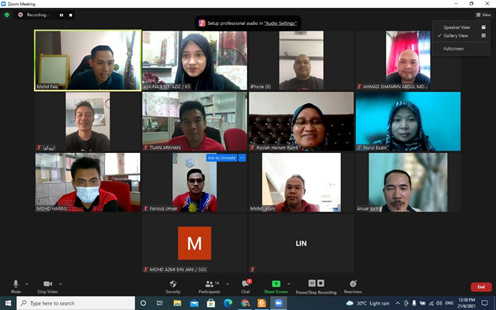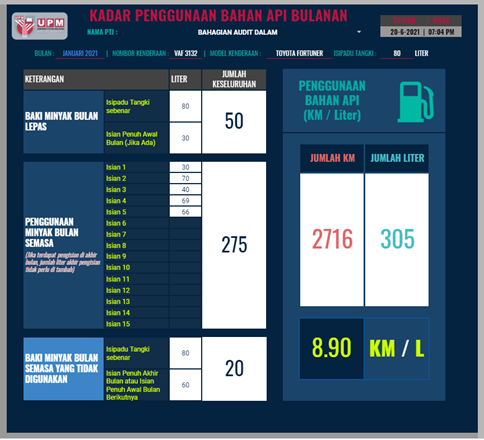Prepared by : Pn. Nurul Ezani Abdul Malek (Pen. Akauntan)
Accountability in Managing Vehicle
Serdang, 21 June 2021- The Center for Strategy and Corporate Relations has organized a briefing on the management of departmental vehicles on 21 June 2021. The Center for Strategy and Corporate Relations has invited Mr. Mohd Faiz Suparman from Internal Audit Department to give the briefing. The briefing made virtually through the Zoom application was attended by a total of 14 participants.

There are 7 contents presented by Mr. Mohd Faiz Suparman:-
- Legislation and Regulations
The rules used for the management of departmental vehicles are:-
- Pengurusan Kenderaan WP4.1
- Kemalangan yang Melibatkan Kenderaan Kerjaan Malaysia WP4.2
- Pekeliling Bendahari Bilangan 2 Tahun 2008
- Akta Badan Berkanun Tatatertib dan Surcaj (AKTA 605)
- Responsibilities and Roles

- Indent Card Management
An indenture card is an electronic card used to make vehicle fuel supply transactions. There are 4 types of cards:-
- Individual Card;
- Driver's Card;
- Vehicle Card; and
- Vehicle Officer Card (Fleet Manager)
Each refueling transaction must be recorded in the Vehicle Log Book. Checks must be made for refueling transactions with reports/statements issued by the supplier. The vehicle card must be kept by the Vehicle Officer and handed over to the driver if there is a need to refuel. Once the filling is made, the vehicle card must be returned to the Vehicle Officer.
- Vehicle Log Book Management
A Log Book is a book to record all trips, fuel consumption and scheduled maintenance as well as summons on a vehicle. The log book is intended to:-
- Ensure accountability for the management of a vehicle
- Determine when a vehicle needs to be replaced
- Determining a reasonable rate of oil consumption (Economic)
- Identify the ownership of the summons issued by the authorities
- Claiming overtime
- As proof of attendance record if the Driver has work outside the area.
The information that needs to be completed in the Log Book is as follows:
- Vehicle information;
- Scheduled maintenance records;
- Information on traffic offense notices;
- Details of vehicle usage; and
- Monthly fuel consumption rate.
Mr. Mohd Faiz Suparman has also developed a formula on google sheet for the calculation of monthly fuel consumption to facilitate drivers and vehicle officers to make calculations.

- Touch n Go Management
Government Vehicles can be supplied with a Toll Payment System Card Without Receipt including SmartTAG. A list of procurement and distribution of Toll Payment System Card Without Receipt must be provided. For SmartTAG, it needs to be registered as an inventory according to the University Asset Management procedures. The card must be well cared for to prevent loss or damage. Loss of the card is the responsibility of the officer who uses it and must be reported to the Vehicle Officer for action to obtain the remaining value of the card/replacement card.
- Vehicle Storage
Departmental vehicles must be stored in a covered office area when not in use unless such facilities cannot be provided. For Departments that have security guards, scheduled patrols must also be conducted on the depot or storage place.
- Vehicle Management Audit Issues
There are several audit observations on vehicle management, namely:
- Vehicle file not provided
- Incomplete logbook information
- No confirmation of vehicle use by vehicle officer
- Indent card movement record not created/no card movement control
- Monthly fuel consumption analysis was not made
- The original copy of the vehicle log entry is not divorced and filed
- Fuel purchase receipts are not kept and filed
- Use of indenture cards for vehicles that have lapsed
- Purchase of oil using expensive fuels
- Refueling in a short time with a distance of 1-3 minutes
- Refueling frequency on public holidays and weekends
- Irregular and repetitive vehicle odometer filling (on smart pay)
- Frequency of use of fleet manager card
- Verification of smartpay statement is not verified by vehicle officer
- No evidence of cross -checking was made between the statement and the vehicle log
- Attach the front page of the statement for payment
- Purchase of fuel is not a PTJ transaction
- Rental vehicles are not monitored as per the contract agreement
- Monitoring of rental vehicle maintenance is not done
- Bring a department vehicle for use to and from work
- Departmental vehicles are used for night market work purposes
- Use of departmental vehicles as official vehicles of the post
- Use of touch n go cards is not monitored
- Touch n go registration using the name of the individual instead of the name of the PTJ
Pn Askina Aziz as the organizer thanked for the knowledge sharing presented by En Mohd Faiz Suparman. It is hoped that the information provided can help drivers and vehicle officers to carry out their duties more efficiently.
Date of Input: 06/08/2021 |
Updated: 06/08/2021 | nurmiera
MEDIA SHARING































